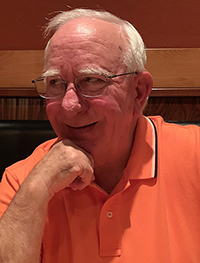Letters to Karen Carpenter
poems by
Richard Allen Taylor
ISBN: 978-1-59948-965-0, 104 pages, $16 (+ shipping)
Release Date: September 12, 2023
The Advance Discount on this title has expired. Those who prefer to pay by check, the price is $20/book (which includes shipping & sales tax) and should be sent to: Main Street Rag, PO BOX 690100, Charlotte, NC 28227-7001.
Or order the complete set of Richard Allen Taylor’s books here (at a discount):
 Richard Allen Taylor is the author of three other poetry collections, most recently Armed and Luminous (Main Street Rag, 2016). His poems, articles, and reviews have appeared in Rattle, Comstock Review, The Pedestal, and Litmosphere, among others. A Pushcart Prize and Best of the Net nominee, Taylor formerly served as review editor for The Main Street Rag and co-editor of Kakalak. He and Kakalak co-editors received the Irene Blair Honeycutt Legacy Award for service to the writing community. After retiring from a business career, he earned an MFA in Creative Writing from Queens University of Charlotte and now resides in Myrtle Beach, SC.
Richard Allen Taylor is the author of three other poetry collections, most recently Armed and Luminous (Main Street Rag, 2016). His poems, articles, and reviews have appeared in Rattle, Comstock Review, The Pedestal, and Litmosphere, among others. A Pushcart Prize and Best of the Net nominee, Taylor formerly served as review editor for The Main Street Rag and co-editor of Kakalak. He and Kakalak co-editors received the Irene Blair Honeycutt Legacy Award for service to the writing community. After retiring from a business career, he earned an MFA in Creative Writing from Queens University of Charlotte and now resides in Myrtle Beach, SC.
Remarkable book! Traversing the music of his universe while navigating the complexities of love, loss, aging and dying, Richard Allen Taylor masterfully delivers poems that had me laughing out loud at times—poems created not as comic relief from sorrow, but as natural reflections on life, myth and art. Photographically in words, among his poignant images Taylor captures the ravages of chemo, a husband weeping in his deceased wife’s closet, a searcher finding light in darkness: “As stars grow old, most still burn with dying/light….” ~Irene Blair Honeycutt, author of Beneath the Bamboo Sky
Richard Allen Taylor is “part of the holy jangle of things / fastened to the belt loop of a forgetful world.” His new book speaks to grief and healing with the whispered voice of his late wife, Julie – “a mellow bell rings in the canyon. / And the canyon is me.” – and weaves from the humbly wonderful things of Richard’s world life-giving joy. And some good jokes. At the end is not sadness but wonder, and friendship. ~Bill Griffin, How We All Fly, The Orchard Street Press (2023)
If I wanted to invent something, but I knew only that I wanted my invention to be dazzling from every angle, I would call on Richard Allen Taylor, whose poems in “Letters to Karen Carpenter,” are each small miracles of construction. Draw near them, and you will hear the poet’s brain sawing through the trivial to reach the essential. Come closer. Now feel the thrum of an out-sized heart that has known pain and grief, tenderness and joy. Letters to Karen Carpenter simply takes my breath. ~Dannye Romine Powell, author of In the Sunroom with Raymond Carver
La Chambre d’écoute, 1952
~Oil on canvas by Belgian surrealist René Magritte
It’s The Listening Room in English, impossible
in any language except yours, Magritte—
a language of images, not words—and who else
would dare to set a giant green apple in a room
that barely contains it, where sunlight bursts
through the big window on the left, illuminating
the pomme on one side, leaving the right in shadow,
as if to imitate a lunar eclipse in progress. And notice
the brown stem, almost poking the ceiling. But why
listening? Do these walls have ears? Does the apple?
Yes, I know potatoes have eyes, yet I sense you
are not dotting those but rather crossing your tease.
Where, you seem to ask, does a thousand pound
apple sit? Wherever it wants. But perhaps symbols
clash. Eve’s disobedience, Adam’s weakness,
half in light, half in darkness, confined to a one-
bedroom Eden that can’t hold them much longer.
Remembering Tokyo, 1953
I was a child and had no memory of the war.
Too young to know the word metaphor,
I knew the streets, covered with snow,
made me think of meringue on lemon pie.
I remember Mt. Fuji in its white cap,
drifts piled against my father’s gray Ford,
the happy-face a passerby drew
on the windshield. Dad rented a house
in Setagaya-ku. Surprised to find the doors
inside could not be pushed or pulled, I learned
to slide them, not punch holes in the rice-paper
panes. My brother and I shared our red wagon
with Yoshiko and Akiho next door, and played
hopscotch, overcoming the language barrier.
We established international trade—swapped
chocolate cookies for sweet rice treats—unaware
of distinctions between victors and vanquished.
The kitchen had a wooden icebox instead
of a refrigerator. I later learned most of Japan’s
steel had been shot down or sunk. The ice man
came each morning with a new block in his tongs,
an ohayo gozaimasu for my mother, an arigato
for our business. The tin-can man rolled a cart
door to door, collecting empties. My father
considered the cans worthless, refused the offer
of yen, joined the fellow in an elaborate excess
of polite gesturing, as if they’d reached the finals
of a bowing contest. For Christmas, my brother
received a clown that banged cymbals when pulled
across the floor. Rough play scraped its paint,
and we found a Havoline Motor Oil can beneath.
On a lurching streetcar in Ginza, I rolled like
a clown across the floor, then jumped up, ran
to my mother, expecting sympathy. She chided me
for carelessness. At the Imperial Palace grounds,
pretty girls in kimonos posed for Dad’s camera
with Tommy and me in our cowboy hats. In the back-
ground, cherry blossoms spun like cotton candy.
Our landlady, Mrs. Nikawa-san, gave us candy.
Mom caught us banging on her door
like beggars, asking for more. I didn’t know
san meant Mr. or Mrs.—that we had called
her Mrs. Mrs. Nikawa all the months we lived
there. Apples were fifty yen on the street.
I can still say konichiwa in greeting, answer
the phone moshi-moshi, ask my brother
to pass the butter dozo. We walked sidewalks
without fear. The Emperor had guaranteed
our safety. I don’t remember any talk
of Hiroshima, but we were children then.
We had no memory of the war.
Then Suddenly Out Popped This Voice
Even the great Buddy Rich said you were a good drummer.
Your voice would soar up the charts later. At sixteen, you sang
in tune but lacked vibrato, voice thin as a wafer. You wouldn’t
know it was me, you said. Then suddenly out popped this voice.
Your sound combined innocence and sensuality, declared
Paul Williams. Instantly recognizable, said Phil Ramone.
We, your fans, could name your songs in three notes. To Mike
Curb, your one-time boyfriend, it was a microphone voice,
barely audible in the car, but velvet in front of a microphone.
I hear you as a mellow bell ringing in a canyon.
And the canyon is me.
Agnes Speaks Out
Imagining a letter from Agnes responding to Ron Miller’s
quote: “… if there’s an arch-villain in the story, it’s probably
Agnes Carpenter” (said in a movie review of The Karen
Carpenter Story for The Mercury News, 1989)
I did not kill my daughter.
That’s what I told that reporter,
Barry Morrow, and that’s what
I’m telling you. Tabloids. Some
gossipy fool always blames
the blameless parents. Everything
I did was for my children. My husband
and I worked our hands to the bone
to pay for drums, pianos, music lessons—
whatever they needed. If you ask me, stress
murdered Karen—all that fame, sudden wealth,
and a worthless husband who just wanted
her money. Who knew she had an “eating disorder?”
People say I drove her crazy. Wrong!
I taught her to keep a clean house, and some dumbass
says I passed along my “obsession for neatness”
to her. And that psychiatrist making it sound like
Karen had to compete with her brother for my love.
Ridiculous!
Karen was just the better singer.
Richard was the musical genius.
Everybody knew it.
Those are the facts.
Karen knew I loved her.
Why do they all think
I needed to tell her?
That’s not the way
we do things in this family.


 Richard Allen Taylor is the author of three other poetry collections, most recently Armed and Luminous (Main Street Rag, 2016). His poems, articles, and reviews have appeared in Rattle, Comstock Review, The Pedestal, and Litmosphere, among others. A Pushcart Prize and Best of the Net nominee, Taylor formerly served as review editor for The Main Street Rag and co-editor of Kakalak. He and Kakalak co-editors received the Irene Blair Honeycutt Legacy Award for service to the writing community. After retiring from a business career, he earned an MFA in Creative Writing from Queens University of Charlotte and now resides in Myrtle Beach, SC.
Richard Allen Taylor is the author of three other poetry collections, most recently Armed and Luminous (Main Street Rag, 2016). His poems, articles, and reviews have appeared in Rattle, Comstock Review, The Pedestal, and Litmosphere, among others. A Pushcart Prize and Best of the Net nominee, Taylor formerly served as review editor for The Main Street Rag and co-editor of Kakalak. He and Kakalak co-editors received the Irene Blair Honeycutt Legacy Award for service to the writing community. After retiring from a business career, he earned an MFA in Creative Writing from Queens University of Charlotte and now resides in Myrtle Beach, SC.